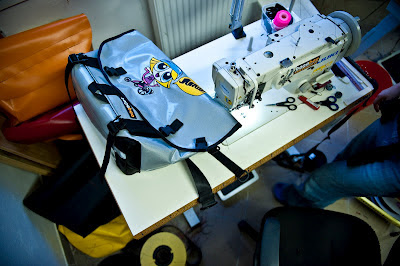 |
| Tamás Tűhegyi sewing bags as his mother taught him. |
 |
| With each of its bags being handmade, Bagaboo can offer custom detailing. |
Tűhegyi worked on design and manufacturing, his mother helped with custom embroidery and his sister pitched in by answering email orders and processing invoices. From the beginning, Bagaboo strived to fill a niche for durable, customizable bags that match the quality of established international brands while having the cost advantages of a Central European base. Initially, the company plied the Hungarian market, advertising on the Internet and through Tűhegyi’s social connections in the bike-messenger community. In time, he translated the website into English and began selling bags abroad, mainly in Japan, Germany and the UK, and recently in the Netherlands.
The company's product line began with a basic messenger bag and hip pouch, and was soon beefed up with a professional messenger bag called the "Workhorse". These days, the selection also incorporates double-strapped backpacks, tool pouches, iPad sleeves and U-lock cases. As evidence of Bagaboo's fashion focus, the website describes an item called the "Eco-bag" as ideal for customers "who like the style ... of messenger bags, but not always using their bag on a bicycle". Future bags will be designed especially for school children. (As I told Tűhegyi, considering the volume of stuff Hungarian school kids have to schlep back and forth from school, this is sure to be a lucrative market).
When I did an email interview with him last week, Tűhegyi said he didn't know how many bags he produced per month. He said he's only concerned whether the business is running smoothly, and that he doesn't keep track of things like production volume or growth forecasts. However, in a 2008 article, he indicated that the company was making approximately 100 bags per month at that time, with each of Bagaboo's five sewers turning out approximately one bag every three hours. These days, in addition to founding family members, Bagaboo employs six workers to cut fabric and sew bags, and production has moved from the family flat to a proper industrial space.
Although its markets have expanded beyond Hungary's borders, Bagaboo maintains a highly visible presence in the Budapest cycling community. Along with fellow Hungarian bag makers such as Bring a Bag and Lupusbag, Bagaboo highlights its products regularly at bicycle fashion shows in the capital city. A staple of the cycling community’s social calendar, these events provide a stage where traders of cycling paraphernalia can show off their wares in an entertaining, social atmosphere. Bike fashion shows have been held as side events for the twice annual Critical Mass and during closing parties for the national bike-to-work contest (Bringazz a munkaba). Always including participation of cycling activist groups, the events seem to be a simpatico blend of social activism and commerce.
Alongside other local businesses, Bagaboo partners with the Hungarian Cyclists Club, having an icon on the organisation’s homepage and an ongoing promotion in which club members can buy the company's products at a discount.
Despite evidence to the contrary, though, Tűhegyi gives a modest assessment of the industry’s role in popularising urban cycling. Having volunteered as an escort for one of Budapest’s first Critical Masses in the mid-aughts, Tűhegyi still believes that this highly popular social movement is the main driver of the local urban cycling movement. Other actors in the community, including Bagaboo, contribute relatively minor roles, he said.
I asked Janos Laszlo, president of the Hungarian Cyclists Club, about the contribution that companies like Bagaboo make to the popularising of everyday cycling. I was a little disappointed that he didn't give me the expected, agreeable quote that would neatly affirm my thesis. Instead he expressed a viewpoint that I'm familiar with from the CycleChic blog: that people shouldn't feel they need to have special equipment, clothing and accessories in order to cycle.
I agree with that. However, considering the success of dozens of cycle fashion shows over the years, not to mention the proliferation of fixi bikes, rolled-up pant cuffs and messenger (or pseudo-messenger) bags on Budapest streets, there's no question that these trends are part and parcel of the recent upsurge in everyday cycling in Budapest. So while I believe that vanity and consumerism underlie many of society's problems, I'm going to give a pass to cycling fashion.






